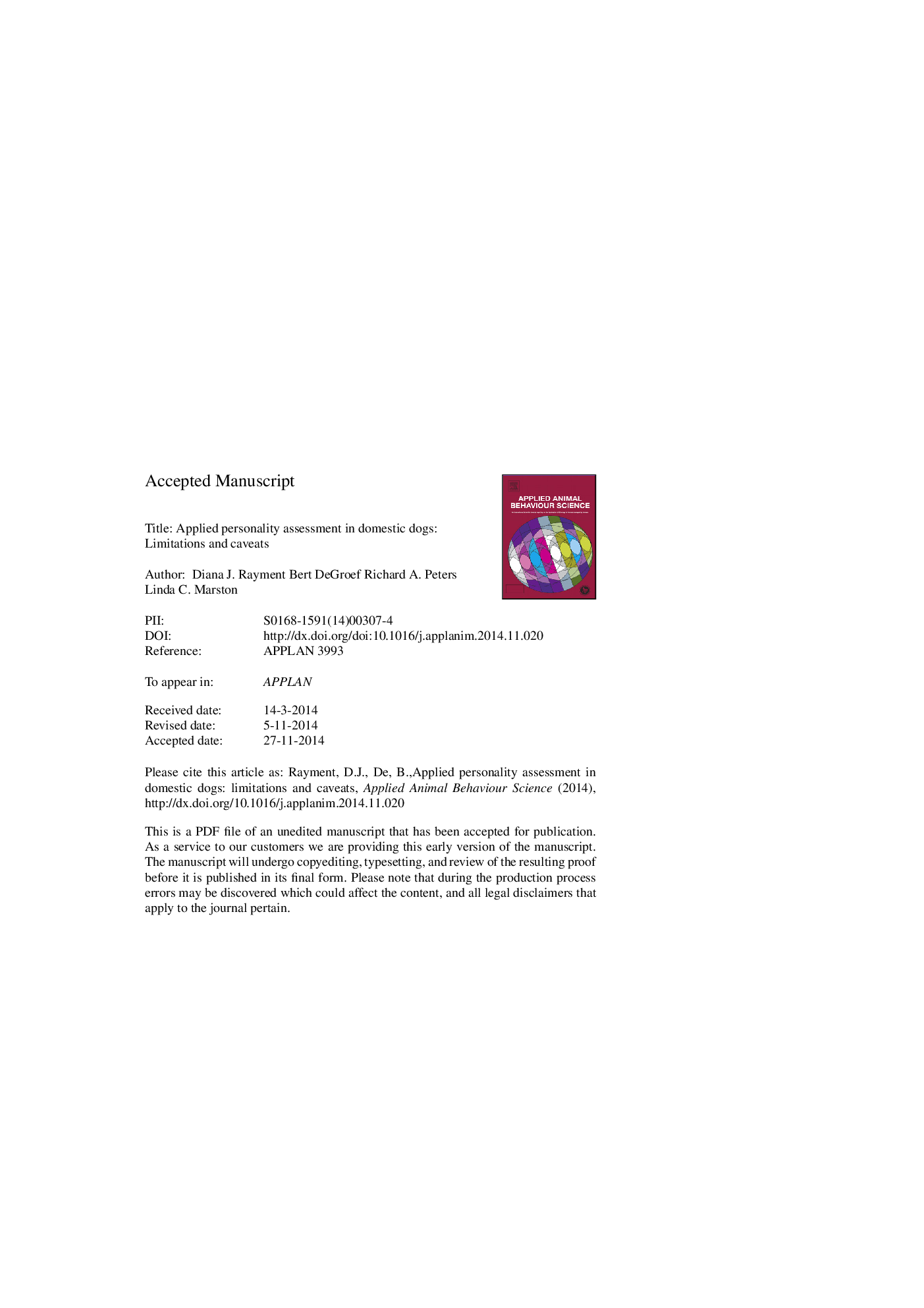| کد مقاله | کد نشریه | سال انتشار | مقاله انگلیسی | نسخه تمام متن |
|---|---|---|---|---|
| 6379608 | 1625343 | 2015 | 62 صفحه PDF | دانلود رایگان |
عنوان انگلیسی مقاله ISI
Applied personality assessment in domestic dogs: Limitations and caveats
ترجمه فارسی عنوان
ارزیابی شخصیت کاربردی در سگهای خانگی: محدودیت ها و هشدارها
دانلود مقاله + سفارش ترجمه
دانلود مقاله ISI انگلیسی
رایگان برای ایرانیان
کلمات کلیدی
DMASAMFFM5-HIAA5-Hydroxyindoleacetic acid - 5-هیدروکسی سدیم اسیدBehaviour test - تست رفتارShyness - خجالتTemperament - دماغdias - روزهاCoping style - سبک مقابلهDog - سگPersonality - شخصیتfive-factor model - مدل پنج عاملHPA - میلی بار یا هکتوپاسکالhypothalamo-pituitary-adrenal - هیپوتالامو-هیپوفیز-آدرنالShelter - پناه
ترجمه چکیده
آزمایش های رفتاری مدرن برای سگ های خانگی معمولا در زمینه های مختلف انجام می شود، از جمله ارزیابی همراه، کمک، سگ های کاری و ورزشی. در حالی که افزایش توجه علمی به توسعه و ارزیابی آزمونهای رفتاری که برای ارزیابی شخصیت استفاده می شود، افزایش می یابد، فقدان ارزیابی قوی در مورد اعتبار و قابلیت اطمینان بسیاری از پروتکل های آزمایش که در حال حاضر در "استفاده از" استفاده می شود، منجر به پرسش های مکرر از استفاده آنها شده است توسط هر دو جامعه علمی و عمومی. این امر به ویژه در بخش رفاه شایع است، که در آن عواقب برای سگ هایی که به عنوان رفتار بی رویه مناسب برای خانه های مجرد شناخته شده اند، بسیار ناچیز است. با وجود حجم زیادی از کار اختصاص داده شده به شخصیت سگ و توسعه آزمون رفتاری، نسبتا کمی از پروتکل های گزارش شده به طور دقیق و قابل اعتماد پیش بینی صفات رفتاری در سگ ها، با توجه به پروتکل های اعتبار سنجی پذیرفته شده و اعتبار سنجی قابل قبول استفاده شده توسط روانشناسان. ناسازگاری در اصطلاح شناختی که برای توصیف رفتار، آزمایش ها و شخصیت های سگ مورد استفاده قرار می گیرد، در ادبیات مربوط به آزمایش شخصیت های کاربردی سگ ها رایج است، و بحث در مورد سودمندی چنین تست ها در محیط کاربردی دشوار است. علاوه بر این، اطلاعات بسیار مرتبط با زمینه های روانشناسی و اخلاق، از قبیل محدودیت های سیستم های به ثمر رساندن تنها رفتار، نیاز به ارزیابی ثبات زمانی و محتوا در حین آزمون شخصیت و تأثیر تحریک، تکانشگری و حالت عاطفی بر رفتار ، ظاهرا توسط برخی از توسعه دهندگان آزمون چشم پوشی شده است، و در نتیجه مجموعه ای از پروتکل های آزمون که از محدودیت های مشابه و قابل پیش بینی طراحی رنج می برند. این بررسی در مورد ملاحظات و محدودیت های برجسته تر مربوط به ارزیابی شخصیت از طریق آزمایش های رفتاری در سگ های خانگی بحث می کند و پیشنهاد می دهد که سازوکارهای ممکن است که این محدودیت ها مورد بررسی و بررسی قرار گیرد. به طور خاص، توصیه می شود که نتایج باتری های آزمایش رفتار مبتنی بر پناهگاه در محدودیت های زمینه ای که در آنها انجام می شود تفسیر شود و توسعه دهندگان آزمون ها روش های دیگر را در نظر می گیرند که شخصیت در محیط پناهگاه می تواند ارزیابی شود.
موضوعات مرتبط
علوم زیستی و بیوفناوری
علوم کشاورزی و بیولوژیک
علوم دامی و جانورشناسی
چکیده انگلیسی
Modern behavioural tests for domestic dogs are commonly employed across a variety of fields, including the assessment of companion, assistance, working and sporting dogs. While there is increasing scientific attention on the development and evaluation of behavioural tests used to assess personality, a lack of robust assessment of the validity and reliability of many test protocols currently in use 'on the ground' has led to the repeated questioning of their use by both the scientific community and the public. This is particularly prevalent within the welfare sector, where consequences for dogs that are identified as behaviourally unsuitable for rehoming are dire. Despite the large body of work dedicated to canine personality and behavioural test development, relatively few reported protocols have been demonstrated to accurately and reliably predict behavioural traits in dogs, according to accepted validation and reliability assessment protocols used by psychologists. Inconsistencies in the terminology used to describe behaviour, tests and canine personality are common within the literature pertaining to applied personality testing of dogs, making discussion of the usefulness of such tests within the applied environment difficult. Furthermore, highly relevant information gained from the fields of psychology and ethology, such as the limitations of behaviour-only scoring systems, the need to assess both temporal and contextual stability during personality testing, and the effects of arousal, impulsivity and affective state on behaviour, is seemingly overlooked by some test developers, resulting in array of test protocols that suffer from similar, predictable design limitations. This review discusses the most prominent considerations and limitations relevant to the assessment of personality through behavioural tests in domestic dogs, and suggests possible mechanisms through which these limitations may be investigated and addressed. In particular, it is recommended that the results of shelter-based behavioural test batteries are interpreted within the limitations of the context in which they are performed, and test developers consider other methods with which personality may be assessed within the shelter environment.
ناشر
Database: Elsevier - ScienceDirect (ساینس دایرکت)
Journal: Applied Animal Behaviour Science - Volume 163, February 2015, Pages 1-18
Journal: Applied Animal Behaviour Science - Volume 163, February 2015, Pages 1-18
نویسندگان
Diana J. Rayment, Bert De Groef, Richard A. Peters, Linda C. Marston,
